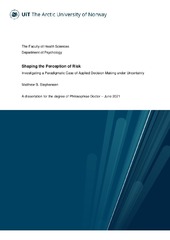| dc.contributor.advisor | Martiny-Huenger, Torsten | |
| dc.contributor.author | Stephensen, Matthew | |
| dc.date.accessioned | 2021-11-23T22:06:40Z | |
| dc.date.available | 2021-11-23T22:06:40Z | |
| dc.date.issued | 2021-12-15 | |
| dc.description.abstract | Risk and uncertainty characterise most human endeavours. Whether judging risk when buying a house, making a career change, considering marriage, or simply ordering food at an unfamiliar restaurant, each decision involves evaluating the available evidence to infer the likelihood of negative outcomes. Such decisions are often marked by uncertainty, the condition of incomplete knowledge about the likelihoods of possible outcomes, which can originate from the unpredictability of the environment or the cognitive limitations of the decision maker. Using the exemplary case of decision making in avalanche terrain, this thesis investigates three specific aspects of how a population with domain-specific experience (backcountry skiers) perform a complex decision task (judging avalanche risk and deciding whether to ski) in a highly uncertain context (avalanche terrain). Paper 1 tests how framing the question that elicits a risk judgment influences risk perception and behaviour intention. Paper 2 investigates the relation between affective evaluations and risk judgments across multiple judgments of specific instances of an activity distinguished by contextual information. Paper 3 examines the roles of uncertainty, domain-specific experience, and affective evaluations in the formation of confidence in complex risk judgments. The findings advance our understanding of how people routinely grapple with complex risk judgments and decisions under uncertainty. This research has theoretical and applied relevance for backcountry skiing in avalanche terrain and more broadly in other fields of applied risk judgments and decisions. | en_US |
| dc.description.doctoraltype | ph.d. | en_US |
| dc.description.popularabstract | Risk and uncertainty characterise most human endeavours. Whether judging risk when buying a house, making a career change, considering marriage, or simply ordering food at an unfamiliar restaurant, each decision involves evaluating evidence to infer the likelihood of negative outcomes. Such decisions are often marked by uncertainty, the condition of incomplete knowledge about the likelihoods of possible outcomes, which can originate from the unpredictability of the environment or the cognitive limitations of the decision maker. Using the exemplary case of decision making in avalanche terrain, this thesis investigates how experienced individuals (backcountry skiers) perform a complex decision task (judging avalanche risk and deciding whether to ski) in a highly uncertain environment (avalanche terrain). The findings have theoretical and applied relevance for backcountry skiing in avalanche terrain and more broadly in other fields of applied risk judgments and decisions. | en_US |
| dc.identifier.uri | https://hdl.handle.net/10037/23145 | |
| dc.language.iso | eng | en_US |
| dc.publisher | UiT The Arctic University of Norway | en_US |
| dc.publisher | UiT Norges arktiske universitet | en_US |
| dc.relation.haspart | <p>Paper I: Stephensen, M.B., Schulze, C., Landrø, M., Hendrikx, J. & Hetland, A. (2021). Should I judge safety or danger? Perceived risk depends on the question frame. Now published in <i>Journal of Experimental Psychology: Applied, 27</i>(3), 485-502, available at <a href=https://doi.org/10.1037/xap0000354>https://doi.org/10.1037/xap0000354</a>. Accepted manuscript version also available in Munin at <a href=https://hdl.handle.net/10037/23139>https://hdl.handle.net/10037/23139</a>.
<p>Paper II: Stephensen, M.B. & Martiny-Huenger, T. (2021). Liking and perceived safety across judgments of distinct instances of a category of activity. <i>Journal of Risk Research</i>. Also available in Munin at <a href=https://hdl.handle.net/10037/22156>https://hdl.handle.net/10037/22156</a>.
<p>Paper III: Stephensen, M.B., Martiny-Huenger, T. & Schulze, C. (2021). Confidence in complex risk judgments: the roles of uncertainty, experience, and affect. (Manuscript under review). | en_US |
| dc.relation.isbasedon | <p>Supplemental materials for Paper I at <a href=https://doi.org/10.17605/OSF.IO/SKNXF>https://doi.org/10.17605/OSF.IO/SKNXF</a>.
<p>Supplemental materials for Paper II at <a href=https://doi.org/10.17605/OSF.IO/VA28N> https://doi.org/10.17605/OSF.IO/VA28N</a>. | en_US |
| dc.rights.accessRights | openAccess | en_US |
| dc.rights.holder | Copyright 2021 The Author(s) | |
| dc.rights.uri | https://creativecommons.org/licenses/by-nc-sa/4.0 | en_US |
| dc.rights | Attribution-NonCommercial-ShareAlike 4.0 International (CC BY-NC-SA 4.0) | en_US |
| dc.subject | VDP::Social science: 200::Psychology: 260::Cognitive psychology: 267 | en_US |
| dc.subject | VDP::Samfunnsvitenskap: 200::Psykologi: 260::Kognitiv psykologi: 267 | en_US |
| dc.title | Shaping the Perception of Risk: Investigating a Paradigmatic Case of Applied Decision Making under Uncertainty | en_US |
| dc.type | Doctoral thesis | en_US |
| dc.type | Doktorgradsavhandling | en_US |


 English
English norsk
norsk
